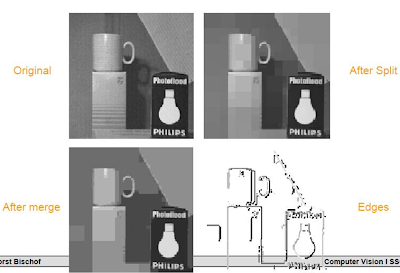- a process of eliminating false boundaries and spurious regions by merging adjacent regions that belong to the same object.
- suitable for edge data segmentation.
- involve identifying each pixel in a raw image as a small region and then merging regions together systematically to grow larger regions.
++ Algorithm for Region Merging ++
1. Merging schemes begin with a partition satisfying condition (4) - using threshold
(4) P(Ri) = True
2. Then proceed to fulfill condition (5) by gradually merging adjacent image regions.
(5) P(Ri U Rj) = False
a. Form initial regions in the image.
b. Build a region adjacency graph (RAG).
c. For each region do :- consider its adjacent region and test to see if they are similar.
- for regions that are similar (P(Ri U Rj) = True), merge them and modify the
RAG
d. Repeat step (c) until no regions are merged.
---------------------------------------------------------------------------------
REGION SPLITTING
- a process of adding missing boundaries by splitting regions that contain parts of different objects.
++ Algorithm for Region Splitting ++
1. Splitting schemes begin with a partition satisfying condition (5)
(5) P(Ri U Rj) = False
2. Then, proceed to satisfy condition (4) by gradually splitting image regions.
a. If P(R) = False, split R into four quadrants.
b. If P is false on any quadrant, subsplit.
---------------------------------------------------------------------------------
REGION SPLITTING AND MERGING
- A better result of region segmentation can be produced by integrating both region splitting and merging together.
- Takes partition that possibly not satisfies neither condition (4) nor (5) with the aim of producing a segmentation that satisfies both condition.
++ Algorithm for Region Splitting and Merging++
1. Split into four disjointed quadrants any region Ri where P(Ri) = False.
2. Merge any adjacent regions Rj and Rk for which P(Rj U Rk) = True.
3. Stop when no further merging or splitting is possible.
---------------------------------------------------------------------------------
REGION USING QUAD TREES
- Extension of pyramids for binary images.
- Three types of nodes (white,black,grey).
-White or black node no splitting.
- Gray node split into 4 sub-regions
---------------------------------------------------------------------------------
- Extension of pyramids for binary images.
- Three types of nodes (white,black,grey).
-White or black node no splitting.
- Gray node split into 4 sub-regions
---------------------------------------------------------------------------------










informative post! I really like and appreciate your work, thank you for sharing such a useful facts and information about recognition scheme management strategies, keep updating the blog, hear i prefer some more information about jobs for your career hr jobs in hyderabad .
ReplyDelete